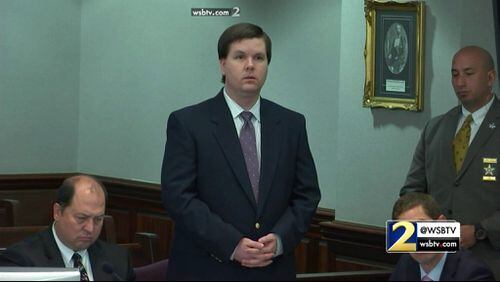The charges against Justin Ross Harris
Count 1: Malice murder
Count 2: Felony murder (caused Cooper’s death while committing cruelty to children in the first degree – with malice, left Cooper alone in a hot car)
Count 3: Felony murder (caused Cooper’s death while committing cruelty to children in the second degree – with criminal negligence, caused Cooper’s death by leaving him alone in a hot car)
Count 4: Cruelty to children in the first degree
Count 5: Cruelty to children in the second degree
Count 6: Criminal attempt to commit the crime of sexual exploitation of children – that is, Harris asking a girl under the age of 18 to send him a nude photo of her genital area
Count 7: Dissemination of harmful material to minors – sending a girl under age 18 a message “containing explicit and detailed verbal descriptions and narrative accounts of sexual excitement and sexual conduct”
After more than two years, the Justin Ross Harris saga will likely come to an end this week with its conclusion hinging on one of three small but key details — one glance, two stammers or three-and-a-half inches.
Closing arguments are set for Monday, almost eight weeks after jury selection began. The six-man, six-woman panel has learned a lot about Harris since then — most of which they'll likely want to forget.
Now, they’ll be asked to jump inside Harris’ head and answer the predominant question that’s loomed over the entire case: Did the former Home Depot web developer intentionally leave his 22-month-old son inside a hot car to die?
Harris faces a malice murder charge of deliberately killing Cooper. But regardless of what jurors decide on malice they can also convict him of criminal negligence, part of a felony murder charge that’s tied to second-degree cruelty to children.
Ultimately it may not matter much to Harris, who faces life in prison if convicted of either charge.
Marietta criminal defense attorney Ashleigh Merchant said she believes the state’s decision to include the malice count was largely strategic.
“One, it allowed them to get all the trash in,” she said, referring to the reams of character evidence exposing Harris’ deceit and reckless sexual appetites. “And, two, it increases the chance of a conviction on felony murder because jurors often see that as a compromise. They have no idea felony murder is not a lesser sentence.”
Did he see Cooper?
Jurors may also be looking for middle ground because the state has failed to prove intent, Merchant said. Not definitively, perhaps, but Dunwoody defense lawyer Esther Panitch said prosecutors supplied sufficient evidence of intent “if jurors are inclined to convict.”
To Panitch, the three-and-a-half inches separating Harris’ head from his son’s car seat is most damning. She also believes Harris would have had to glance to the right, in Cooper’s direction, when reaching for his briefcase after he arrived at the Home Depot office parking lot on the morning of June 18, 2014.
During the trial, defense attorneys have tried to show jurors that Harris would not have been looking directly toward Cooper when he reached for his briefcase, which was on the floor of the passenger seat. Cooper was in his rear-facing car seat, which was slightly behind and to the right of Harris.
While the decision on malice is anyone’s guess, Panitch and Merchant agreed the defense is going to have a tough time prevailing on the negligence charges.
“What was he distracted by? His own obsession,” Panitch said. “You can’t blame it. He caused the distraction.”
And that distraction, clearly, was sex. Some courtroom observers expressed surprise the defense didn’t call any witnesses to testify about a possible addiction, but that would’ve been a dead-end street. Just as alcohol addiction doesn’t absolve a drunk driver, a sex addiction wouldn’t vindicate Harris’ behavior.
It might provide some context, albeit non-binding. The defense has contended that context was largely overlooked by Cobb County police as they built their case against Harris. But they’ve been handcuffed repeatedly by Cobb Superior Court Judge Mary Staley Clark, who has refused to admit much of the defense’s evidence that might point to a rush to judgment by law enforcement.
Staley Clark has long had a reputation for being a prosecutor-friendly judge, and her rulings in the Harris case are unlikely to change that image. If Harris is convicted, it’s possible his defense team may seek an appeal arguing the judge undercut their ability to prove investigators cherry-picked evidence, ignoring anything that pointed to an accident.
‘He destroyed my life’
Meanwhile, lacking any smoking gun, the prosecution has relentlessly assailed Harris’ character, and he gave them plenty of material. Defense attorney Maddox Kilgore even warned jurors in his opening statement they would be exposed to all sorts of “embarrassing and graphic sexual matters,” none of which had anything to do with the death of his son Cooper.
The state faithfully stayed on message. It presented evidence that Harris sent hundreds of sexually explicit text messages to women, including two under-aged teens, and hired a prostitute. He lived two lives — one he kept secret from friends and family, lead prosecutor Chuck Boring said. Because of that, no one knew the real Ross Harris, the state argued.
That includes his former wife Leanna Taylor, whose testimony earlier this week was widely viewed as a win for the defense. Taylor said she believes Cooper’s death was an accident, while making it clear she had little sympathy for her ex-husband.
“He destroyed my life. I’m humiliated,” Taylor said of Harris. “I may never trust anybody again, the way that I did. If I never see him again after this day, that’s fine.”
Prosecutors tried to soften the impact of Taylor’s testimony by calling a rebuttal witness, the last to take the stand before closing arguments.
Cobb police Det. Edward Stockinger said Taylor showed little emotion after he confirmed to her that Cooper was dead.
“I can tell you 100 percent that woman was not emotional,” Stockinger said.
An audio recording of that interview didn’t support his claim, however. While sounding composed initially, Taylor sounded as if she was crying when she told Stockinger, “I just don’t know how we’re going to make it through this. Ross is never going to forgive himself.”
What Harris didn’t say
But it was another piece of audio that’s likely to have a greater bearing on the jury’s decision — one of the few pieces of evidence new to those who’ve followed the case closely.
It’s a recording of Harris’ interview with detectives just hours after he pulled his dead son from his car. On it, Harris is asked to recount his day. After telling investigators he went to lunch with two co-workers, he pauses, says “um” twice and then says he was dropped off at his office.
He neglected to tell them he bought some light bulbs at Home Depot after lunch, then stopped by his car to drop them off. At that point Cooper had been locked inside for about three hours. It’s unclear whether he was alive or dead.
“It is highly unlikely that he forgot,” Cobb Police Det. Phil Stoddard testified. “All things being equal I would have to admit it’s possible.”
That sliver of doubt hangs over much of the evidence presented in the case.
But for the jury, equivocation is not an option.
About the Author







